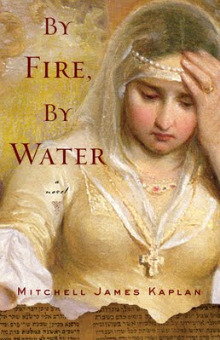Matt Rees's Blog - Posts Tagged "alexandre-dumas"
Going historical
 Writing of the disdain expressed for genre novels by critics, Raymond Chandler said that there were just as many bad “literary novels” of the type favored by critics as there were bad genre stories – except that the bad literary novels didn’t get published. In other words, there’s nothing inherent in so-called genre fiction that makes it lesser than “literary” fiction.
Writing of the disdain expressed for genre novels by critics, Raymond Chandler said that there were just as many bad “literary novels” of the type favored by critics as there were bad genre stories – except that the bad literary novels didn’t get published. In other words, there’s nothing inherent in so-called genre fiction that makes it lesser than “literary” fiction.Chandler knew what he was talking about. His great noir novels, such as “The Big Sleep” and “The Long Goodbye,” are must-reads for anyone who wants to know how to build a sentence and a voice, how to create an image that won’t fade a few pages on, how to make people want to read it all over again. His contemporaries in the “literary” field who were more favored by the highbrow critics of his time are these days consigned to the dustbin of college literature courses. (If you don’t believe me, tell me when was the last time you reached for a volume by Upton Sinclair or Pearl Buck?)
But historical fiction is back. Ever since “The Name of the Rose” (published in English in 1983), the genre has accrued greater legitimacy. Last year’s Booker Prize went to a historical novel (“Wolf Hall”) and this year’s looks likely to go to “The Thousand Autumns of Jacob de Zoet” (do an internet search for its author David Mitchell and “genius,” and you’ll see why.)
Even poor old Alexandre Dumas and the swashbuckler have been returned from their long-ago burial under a mound of critical invective. In the last decade or so, Dumas has found his way into the title of a novel by Arturo Perez-Reverte, one of the most notable historical novelists of our time. Perez-Reverte can buckle a swash in the form of his Dumas-derived Captain Alatriste series, but he also has enough modern perversity for one of his novels to have been adapted for the screen by Roman Polanski. (That novel, “The Club Dumas,” even included a reference to Eco, “the professor from Bologna,” in a nod to his role in legitimizing the genre.)
Read the rest of this post on my blog The Man of Twists and Turns.
Published on September 01, 2010 00:06
•
Tags:
alan-furst, alexandre-dumas, arturo-perez-reverte, barbara-nadel, barry-unsworth, caleb-carr, captain-alatriste, caravaggio, crime-fiction, david-mitchell, hilary-mantel, historical-fiction, j-sydney-jones, literary-fiction, mozart, mozart-s-last-aria, new-york, omar-yussef, palestinian, pearl-buck, raymond-chandler, sacred-hunger, the-big-sleep, the-club-dumas, the-long-goodbye, the-name-of-the-rose, umberto-eco, upton-sinclair, west-bank, wolf-hall
The Inquisition, the Jews of Andalus, and Columbus: 'By Fire By Water' review
 Historical novels vie with crime and romance novels for the titles of most derided and most widely read literature. They've had a bad rap ever since the 19th century, when the swashbucklers of Alexandre Dumas looked pretty wooden next to Dickens, and cartoonish in comparison to the depth of Victor Hugo or George Eliot. There have always been marvelous exceptions, such as Mary Renault's amazing novels of ancient Greece, but for much of the last century, historical fiction was seen as pure escapism, barely distinguishable from bodice-ripping romance.
Historical novels vie with crime and romance novels for the titles of most derided and most widely read literature. They've had a bad rap ever since the 19th century, when the swashbucklers of Alexandre Dumas looked pretty wooden next to Dickens, and cartoonish in comparison to the depth of Victor Hugo or George Eliot. There have always been marvelous exceptions, such as Mary Renault's amazing novels of ancient Greece, but for much of the last century, historical fiction was seen as pure escapism, barely distinguishable from bodice-ripping romance.Since the publication of "The Name of the Rose," in 1980, the genre has gained gradual legitimacy. Much snobbishness still abounds, however, over the commercial success of historical fiction and the perceived tendency of genre writers to simplify bygone eras. Still, though Umberto Eco's book has sold 10 million copies, it undoubtedly takes some brains to appreciate it, and no one could accuse Eco of writing simplistic books. Literary highbrows came down to mix with the hoi polloi long enough to award last year's Man Booker Prize, the most notable British book award, to Hilary Mantel's "Wolf Hall," a wonderful evocation not just of Tudor England but of the contrast between a steely self-made man and a bunch of spoiled, weak upper-class brats. The legitimacy of the genre progresses this year with the deification in both the United Kingdom and the United States of David Mitchell, whose novel about Japan in 1799, "The Thousand Autumns of Jacob de Zoet," is a candidate for the Booker and who, even before this latest work, has routinely been referred to as a genius by reviewers.
Read the rest of this post on my blog The Man of Twists and Turns.
Published on September 03, 2010 04:45
•
Tags:
abdel-aziz-rantisi, alexandre-dumas, andalus, by-fire-by-water, charles-dickens, crime-fiction, david-mitchell, gaza, george-eliot, hamas, hilary-mantel, historical-fiction, inquisition, islam, jews, judaism, mary-renault, mitchell-james-kaplan, muslims, palestinians, reviews, romance-fiction, spain, the-name-of-the-rose, umberto-eco, victor-hugo, wolf-hall, zaragoza



